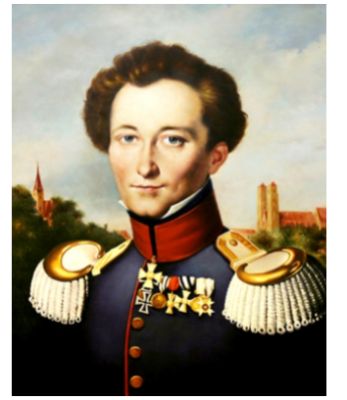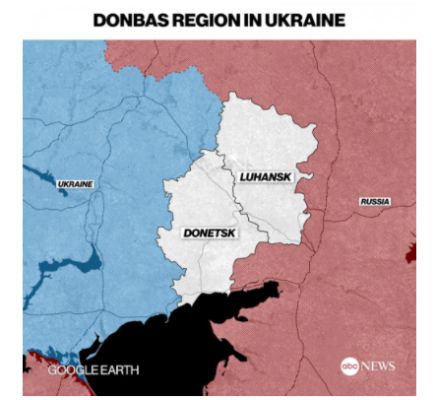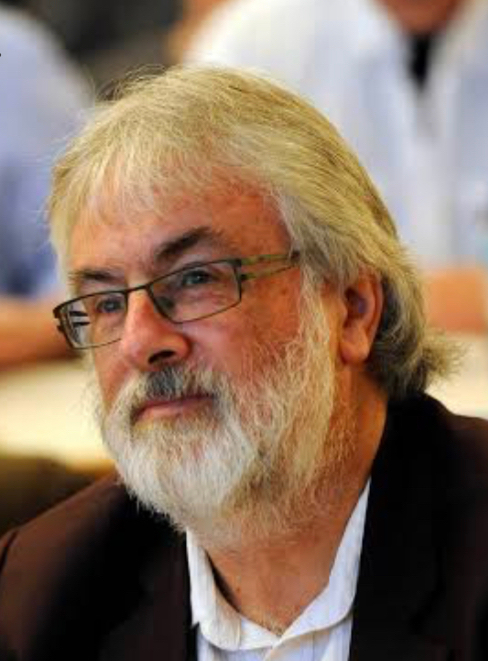Ukraine War – A Continuation Of Politics With The Admixture Of Other Means
Carl Philipp Gottfried von Clausewitz (1780-1831) was a Prussian general and military theorist who stressed the ‘moral’ and political aspects of war. He is a source of many succinct quotations with arguably the most well-known being “War is nothing but a continuation of politics with the admixture of other means.” Admixture is a rarely used word; when something (other than water) is mixed with something else.

If the Prussian general was observing today’s war between Russia and Ukraine he would probably find his quote as applicable now as he did then. But he might wish to downplay his view on the ‘moral’ aspects of the war and replace it with ‘economic liberalism’. General Clausewitz might also tweak the ‘political’ aspect to ‘geopolitics’.
It is impossible not to be horrified by the murderous military invasion of Ukraine by Russia. However, the issues are much wider and more complicated than the inhuman invasion of one country by another. Further, if the focus is on personalities such as Vladimir Putin and Volodymyr Zelenskyy, then the analysis will be found wanting.
The invasion should be seen in the backdrop of economic liberalism and geopolitics. To further strengthen analysis it is best to focus on ‘first principles’ so that convolution and the minefield of hypocrisy can be avoided.
The first ‘first principle’
The first of the ‘first principles’ is, without qualification, that the invasion of Ukraine is unjustified. It has created a humanitarian disaster for Ukrainians. Complex politics sits behind this conflict but the loss of lives of the innocent is not the way to resolve them.
This innocence is highlighted by the reported Russian bombing that severely damaged a maternity and children’s hospital leading to multiple deaths in the port city of Mariupol in south-eastern Ukraine (occupied by Ukrainian troops but claimed by the separate Russian led republic of Donetsk).
Putin can only justify the invasion on the basis of hypocrisy. He calls it a ‘military operation’. Arguably his terminology might have some validity if he was seeking to protect concentrations of Russians living in eastern Ukraine. But this is an all-out invasion across the whole country even it this protection was the end goal.
Putin also argues that he wants to free Ukraine of its Nazi influence. Highly laudable one might think as there is a (neo) Nazi movement in the country as part of a wider far right. It was influential in the coup of 2014 that overthrew the then elected president , including the Azov Battalion (a Nazi paramilitary militia).
But Nazi-type influence appears much less now (although alarmingly the Azov Battalion was subsequently integrated into the Ukrainian armed forces). Further, while not a Nazi, Putin himself is an authoritarian far-right politician. Hardly an ambassador for democracy.
Although written before the invasion, one of the best contemporary background articles I’ve read on the conflict between the two neighbouring countries is by British and Pakistani socialist Tariq Ali published (16 February) in Side Car (the blog of New Left Review) News from Natoland
Despite his highly critical analysis of NATO in this conflict , Ali is unequivocally opposed to the Russian invasion but his analysis is appropriately broader than this.
Hypocrisy runs rife
The public display of unqualified support by the European Union (EU) for Ukrainian refugees reeks of hypocrisy (of course, the United Kingdom just had to be the opposite) when compared with its appalling response to refugees from other parts of the world such as Africa, Asia and the Middle East.
Shocking present day brutality engineered by the EU is highlighted in this gut-wrenching article by American journalist Ian Urbina in Le Monde Diplomatique (January 2022): EU’s shadow immigration system .
This is not an argument for treating Ukrainians as harshly as other refugees. But it is an argument about hypocrisy and the need for treating these other refugees the same as Ukrainians.
Chechnya, part of Russia, provides a tragic example of hypocrisy. In 1999 the Russian government led by Putin initiated a military campaign in Chechnya against those seeking independence. The campaign was brutal with massive loss of life.
By early 2000 Russia almost completely destroyed the capital city of Grozny. The hypocrisy is that Putin’s actions were willingly condoned at the time by both the United States and the United Kingdom.
Then we have the hypocrisy of the United States’ foreign policy. No country has been responsible for more overseas wars since World War 2 or regime change (both attempted and successful) than the US. Russia is an amateur by comparison.
While war rages in Ukraine the US has significant ongoing responsibility for the repression of Palestinians by Israel’s government and the current humanitarian disaster in Yemen.
NATO involvement
However, if all we know about the invasion of Ukraine is the invasion, then that is all that we will know. At the heart of the widening conflict that led to (but does not justify) Russia’s invasion is the widening conflict between the North Atlantic Treaty Organisation (NATO) and Russia.
NATO was established after World War 2 as a United States led military alliance of western European countries, Canada and the United Kingdom against the Soviet Union (of which both Russia and Ukraine were part) and other eastern European countries (such as Poland and Hungary) that made up the Warsaw Pact. This was all part of what was then known as the ‘Cold War’.
The demise of the Soviet Union should have made NATO redundant. Instead NATO continues to expand towards the Russian border. In the mainstream media the predominant message is that Russia is challenging NATO and the ‘international rules-based order’ (in reality, a ‘US rules-base order’).
The trigger point, so the messaging goes, was Russia’s 2014 annexation of Ukraine’s Crimean peninsula which was evidence of Putin’s goal of rebuilding Russia’s long-lost empire.
Should Ukraine join NATO it would enable the US-led military alliance to establish missiles right up to the Russian border. It is easy to imagine the reaction if Russia was able to set up its missiles in Canada or Mexico.
The mainstream media messaging is highly misleading. It excludes the crucial role the US by itself and through NATO has played in escalating tensions. This begins with its extensive role in the 2014 coup in Ukraine that preceded Russia’s annexation of Crimea.
February 2014 coup
The 2014 coup and Crimean annexation need to be understood in the context of the US strategy of opening up Ukraine to foreign investors and multinational corporations. The US led International Monetary Fund (IMF) leverages aid loans to push governments to adopt policies friendly to foreign investors.
The IMF has been at the centre of efforts to reshape economies around the world for decades, often with disastrous results. The current civil war in Yemen and coup in Bolivia (subsequently defeated) both followed a rejection of IMF terms.
Linked to Ukraine joining the European Union, the IMF was planning to implement a series of economic reforms to liberalise the economy (ie, extend neo-liberalism), including wage levels, subsidies, and both the health and education sectors, in order to make it more attractive to foreign investors.
This led, in 2013, to Ukrainian President Viktor Yanukovych ending trade integration talks with the EU. Instead he restarted economic negotiations with Russia. This set in motion the basis for the coup the following February.
The United States became engaged hands-on in a destabilisation campaign against the Yanukovych government. It culminated with the overthrow of the elected president in February in what is known as the ‘Maidan Revolution’ (also known as the ‘Maidan Coup’) named for the Kiev square where most of the protests were held.
Yanukovych was at best not an endearing person. He was widely believed to be corrupt but was not alone in that respect, either before or after his presidency. He was elected with a clear majority in an election that was as democratic as other elections held previously and subsequently.
His electoral support was strongest in the regions of the country and less so in the capital (hence the name of his political party, the ‘Party of the Regions’). Elected Yanukovych was and overthrown he also was.
Crimea
Russia’s response was to annex Crimea but there is more to this than the mainstream media messaging of resurrecting the old Russian Empire. From Russia’s point of view, a long-time adversary had successfully overthrown a neighbouring government.
Crimea has an interesting history. In 1921 Crimea became an autonomous republic within the new Soviet Union. It was dissolved in 1945 and became part of Russia. Next, after the death of Joseph Stalin in 1953, there was a shift in approach in the relationship between Russia and the other Soviet republics.
As part of this shift, Nikita Khrushchev (himself part-Ukrainian) successful led a reconciliation initiative with Ukraine leading to the transfer of Crimea from Russia to Ukraine the following year.
Come February 2014 Crimea was home to one of two Russian naval bases with access to the Black and Mediterranean seas. It is unsurprising that a Crimea controlled by a US-backed Ukrainian government was considered to be a major threat to Russian naval access.
In March Russia held a plebiscite of Crimeans on whether they should join Russia or remain in Ukraine. A massive 95% voted to join Russia. While this was not an independently monitored plebiscite the result was not that surprising.
The large majority of Crimeans were Russian and Crimea had only been part of Ukraine for less than 70 years. While most Ukrainians speak both Russian and Ukrainian, in Crimea only 2% mainly spoke Ukrainian.
Self-determination as a second ‘first principle’
None of this – the integration of Ukraine into the neo-liberal European Union, the February 2014 coup in Ukraine, or the threatened expansion of NATO military capacity to the Ukraine-Russian border – justifies the Russian invasion of Ukraine. The inhumane impact of the invasion on Ukrainians is sufficient reason for this conclusion.
In his lengthy address announcing the invasion Putin was critical of another Vladimir. This was Lenin, the first leader of the Soviet Union, who supported Ukraine as a separate soviet republic instead of being part of the Russian republic.
Lenin had an acute understanding of the importance of self-determination as a socialist principle that offers a way forward and an alternative to military force.
Ukraine’s right to self-determination must be respected. But, equally so, should the same right apply to highly Russian populated areas of eastern Ukraine near the Russian border.

Even in more peaceful times achieving full (rather than selective) self-determination would be difficult. The Russian recognised separate Luhansk and Donetsk republics are located in the Donbas region of eastern Ukraine.
There have been significant political differences, including in presidential elections, between eastern and western Ukraine since the fall of the Soviet Union in 1991. Ukraine has been a polarised country.
Local plebiscites would be necessary to achieve self-determination in parts of the east. They would need to be independently monitored and not necessarily covering the whole populations of Luhansk and Donetsk. The republics laying claim to them only control part of the territory (perhaps a third) and there are also many non-Russian Ukrainians living there.
Defining the boundaries for plebiscites would be difficult but achievable if there is a meeting of minds. It is implausible to believe that the citizens of Donetsk’s second largest city Mariupol would vote in favour of being part of a Russian aligned republic. Perhaps encouragingly Zelenskyy appears to have expressed recent interest in addressing Russia’s security concerns in the region.
What also needs to happen is that NATO does not further extend its boundaries towards Russia. That is, Ukraine does not become a member. This is geopolitics. NATO does not need to expand for defensive reasons. Expansion would only be seen as an unnecessary aggression.
But, for any of this to eventuate, the first step needs to be an end to the invasion (preceded by a ceasefire). The bottom line is that regardless of the hypocrisy and provocations from the United States and NATO, the Russian invasion is inhuman and should end forthwith.
It is also counterproductive in that despite taking some cities Russia can never win either militarily or politically and it can only strengthen the image of its adversaries. Full self-determination based on a democratic process as close to the grassroots as practical is the only of providing for a sustainable and fair resolution.
If he was here today Clausewitz might well say “Self-determination is nothing but a continuation of politics to avoid war with the admixture of other means.”

No comments:
Post a Comment